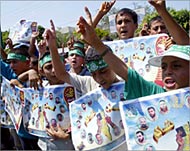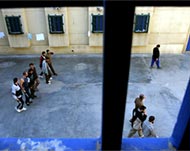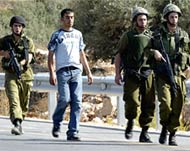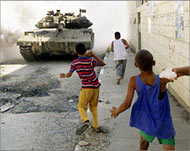The child prisoners of Israel
Rakan Ayad Nasrat was arrested by Israeli forces last September on his way home to Jericho from Bethlehem.

While in Israeli custody, Rakan has been sexually assaulted by a soldier, severely beaten by prison guards, threatened with electric shocks and subjected to long periods of solitary confinement.
He has also tried to commit suicide four times.
Rakan is only 12 years old, making him the youngest Palestinian to be held in an Israeli prison.
After extensive court deliberations, Rakan was allowed to spend the rest of his two-year sentence in a children’s facility in Ram Allah under 24-hour police supervision.
Rakan is just one of hundreds of Palestinian children from the occupied Palestinian Territories who have been arrested, interrogated, and imprisoned by the Israeli occupation forces in a manner inconsistent with international law.
Last resort
 |
|
Palestinian are often caught up in |
According to Article 37 United Nations Convention on the Rights of the Child, detention or imprisonment of a child should be used “in conformity with the law” and “as a measure of last resort”.
But the non-profit Defence for Children International, Palestine Section (DCI), says Israeli occupation forces view it as a matter of routine.
Some 2200 minors have been imprisoned since the start of the Intifada.
This number does not include the 1500 child administrative detainees that have been held without charge for up to eight days under a new Israeli military order, or the more than 1000 prisoners who were detained while they were children and continue to serve prison terms.
Around 750 minors were arrested in 2002 alone, and an additional 500 in 2003.
“There are 370 children in Israeli prisons as we speak, spread around in five prisons and ten administrative detention centres,” said lawyer Khalid Quzmar of DCI, who represents the vast majority of Palestinian child prisoners.
Deteriorating situation
 |
|
Israeli prisons currently hold |
According to Quzmar, the situation of child prisoners continues to deteriorate, with an increase in cases against younger children ages 14 and under and a marked trend towards longer sentencing.
From 10 December 2003 until now, over 50 children have been detained, all around 13 to 14 years.
Approximately 90% of all Palestinian child prisoners have been arrested for charges of “rock-throwing”, says Quzmar.
In most cases, like that of 13 year-old Amin al-Darraj’s, the charges are for incidents dating back two or three years.
Al-Darraj was coerced into confession and then detained, say his lawyers. His appeal to the military court was denied, and al-Darraj has been living in the Ofer detention Centre near Ramallah, which is little more than a makeshift tent camp surrounded by barbed wire.
Along with 14 other children detained on the same charges, al-Darraj has been living in abysmal conditions in Ofer for over two weeks now.
“There is no heating, and the water is absolutely freezing, it’s absolutely criminal” said his lawyer. “What is the danger such a child can pose anyway?”
Israeli Defence
|
Israeli military officials claim that stone-throwing is a serious and potentially hazardous offence, however. Throwing stones at fast-travelling Israeli vehicles in Palestinian villages is “dangerous” they say. |
Israeli military officials claim that stone-throwing is a serious and potentially hazardous offence, however. Throwing stones at fast-travelling Israeli vehicles in Palestinian villages is “dangerous” they say.
“We definitely treat this phenomenon as a real problem and once the offenders are caught by the army they are prosecuted and it doesn’t matter if they are a minor or an adult,” an Israeli military official told Aljazeera.net
Israeli officials also hold that while the involvement of youth is one of the “sad implications of the political situation”, the youth are often encouraged to participate in such activities by adults, and must therefore bear the consequences of their actions.
Palestinians say this accusation is “unfounded” and that the participation of youth must be seen within its appropriate political and social context
“Children are constantly searching for something that will make them distinct in this age – they are searching for an identity.
“They are also a part of society just like adults – they have to adapt to the pressures of the political situation with include the social and religious aspects,” said Mahmud al-Ajrami, of the Palestinian Ministry of Foreign Affairs.
“They are acting against a political enemy as they see it so their actions are normal and blend in with the status quo.”
Double-standard
 |
|
Israel defines a Palestinian minor |
Another problem with the system, say analysts, is the Israeli double-standard in dealing with Israeli versus Palestinian youth.
While Israel defines a Palestinian minor as someone younger than 16 years old, that standard for Israeli youth is under 18.
Israeli military officials say they have been forced to reduce the generally accepted 18 year age limit for Palestinians because a large number of would-be “terrorists” fall within the 16-18 year range.
They also contend that that the U.N. Convention on the Rights of the Child allows Israel to choose the age at which it deems fit to try youths for criminal offences.
“There is no one defined age of minors which is accepted worldwide. It’s an internal privilege of each country to define [the age] as long as it is reasonable,” said an Israeli official.
But human rights organizations disagree, citing Article 1 of the Convention, of which Israel is a signatory as proof: “A child means every human being below the age of eighteen years.”
“We think it’s ridiculous that the government has different definitions for what a child is in Palestine and in Israel-you cannot have two definitions,” said Yael Stein, legal researcher at B’tselem.
|
“If you usually define a [minor] as someone under 18, then you cannot change it according to the nationality or actions of a person. You cannot say, for example, that if someone is from an area with more crime then the definition of minor will be defined differently for him. You must have one definition that is not connected to actions or nationality.”
Yael Stein Legal researcher, B’tselem |
“If you usually define a [minor] as someone under 18, then you cannot change it according to the nationality or actions of a person. You cannot say, for example, that if someone is from an area with more crime then the definition of minor will be defined differently for him. You must have one definition that is not connected to actions or nationality.”
Quzmar of DCI agrees, and adds that the children are treated poorly and denied their basic rights regardless of age.
“I think this is discrimination… not a justification. Plus, even those children under 16 whom [Israel] considers minors are treated badly.
“There are no facilities specifically for the Palestinian children, no privacy for the child, and no special treatment. On the contrary they are often abused in prisons.”
Contrary to Article One of the Convention, which states that children shall not be subject to “torture or other cruel, inhuman or degrading treatment or punishment,” a vast majority of the child prisoners and detainees have been exposed to some form of torture while in prison, says Quzmar.
“More than 95% of children are exposed to torture… and while sexual abuse is limited, kids do not always talk about it, and we discover it later.”
Administrative detention
 |
|
Palestinian boys regard engaging |
Another hurdle faced by Palestinian child prisoners and their lawyers is the Kafkaesque Military Order 1500, a relic of British rule in Palestine which allows Israeli authorities to detain an individual, adult or minor, for up to 6 months with no charge.
This time limit is, however, seldom upheld. Twelve-year-old Rakan for example has been sentenced to a maximum 17-month detention despite the military order.
There have been about 100 cases of child administrative detention since 2002. Currently, 85 children are being held based on the military order.
Quzmar says the order poses a multitude of problems, and while designed for adults, it has in practice been extended to children.
“The real problem is that it can be renewed spontaneously so the prisoners do not know when they will go home. There are secret files, and neither the accused nor the lawyer knows what’s in them,” said Quzmar.
Quzmar says when it comes to such cases there is not much he can do as a lawyer.
“With administrative detention my role is pretty much zero. I’m powerless. The only thing we hear in court is one sentence: ‘He is a security threat’ and it’s over. This is a crime against children in international law.”